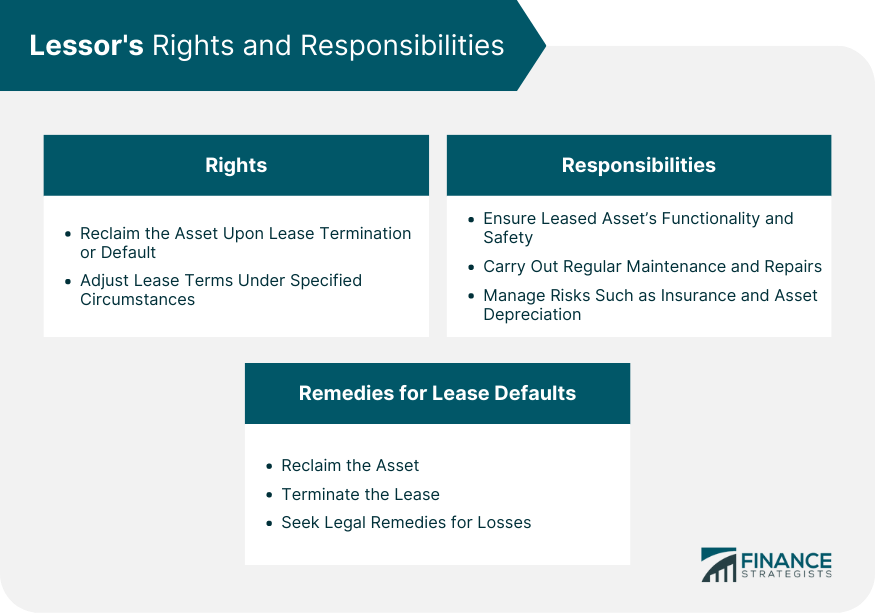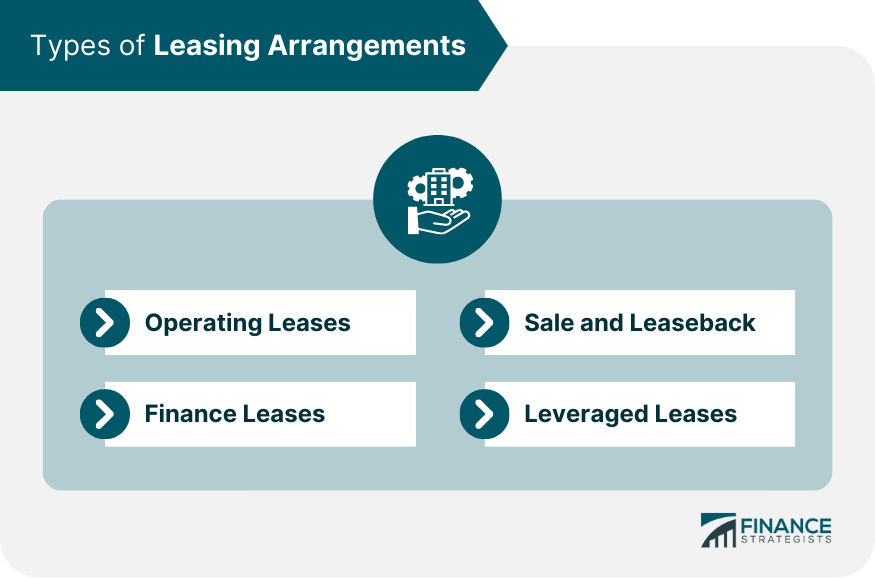A lessor is an individual or entity that leases or rents an asset, typically property or equipment, to another party known as a lessee. The purpose of a lessor is to earn a return on their asset through leasing, providing a steady income stream. The role of a lessor impacts readers, especially in the realms of real estate and business, as understanding this term is vital for any leasing agreements. In a lease agreement, the lessor is responsible for maintaining the asset's condition while the lessee pays for its use. Misunderstanding the obligations and rights of a lessor could lead to legal and financial complications. Therefore, having a firm grasp of the term "lessor" is crucial for successful business transactions and sound personal finance management. Rights of the Lessor: As the asset's legal owner, the lessor can reclaim it upon lease termination or default. They may also modify lease terms under certain conditions outlined in the agreement. Responsibilities of the Lessor: The lessor is responsible for ensuring the leased asset's functionality and safety. This might include regular maintenance and repairs. They are also accountable for managing risks, such as insurance and asset depreciation. Lessor's Remedies for Lease Defaults: If the lessee defaults, the lessor may reclaim the asset, terminate the lease, or seek legal remedies for any incurred losses. Leasing assets is a business activity that can yield significant financial rewards but also carries inherent risks. Lease payments constitute a steady stream of income for the lessor. The income depends on various factors, like the value of the asset, lease duration, and lease terms. The lessor takes on various risks, including asset depreciation, default by the lessee, and potential damage to the asset. However, there are also potential benefits, such as tax advantages and an income stream that may exceed the asset's original cost. Lease transactions can significantly impact a lessor's financial statements. For instance, finance leases are recognized as receivables on the balance sheet, while operating lease income is recognized on the income statement. In many jurisdictions, lessors can claim tax benefits such as depreciation and interest deductions. However, these can be complex and require careful consideration and consultation with tax professionals. In an operating lease, the lessor retains the asset's ownership and usually takes responsibility for maintenance and insurance. In a finance lease, the lessor transfers nearly all the risks and rewards of ownership to the lessee. The lessee typically assumes responsibility for maintenance and insurance. This involves the lessor buying an asset from a company and leasing it back to them. This allows the original owner to free up capital while retaining the use of the asset. In leveraged leases, the lessor borrows a significant portion of the purchase price, usually using the leased asset as collateral. Laws and regulations concerning lease agreements vary by country and sometimes by states within countries. Lessors must ensure they comply with relevant laws to avoid legal complications. Legal advice may be necessary to navigate the complexities of local and international leasing laws. Accounting for lease transactions must adhere to the prevailing accounting standards, such as IFRS 16 and ASC 842. Failing to meet these standards could lead to audit issues and potentially impact the financial health of the lessor's business. In case of disputes or defaults, lessors can seek legal remedies as stipulated by the lease agreement and governing laws. They should engage a competent legal team to handle these situations effectively and protect their interests. Lessors follow a systematic decision-making process when entering into lease agreements. The lessor typically assesses the potential lessee's creditworthiness to gauge the risk of default. This process may involve credit checks, references, and financial statement analysis to ensure the lessee's ability to fulfill lease obligations. The lessor establishes the lease terms, including the duration, payment terms, and responsibilities for maintenance and insurance. These terms must align with the lessor's business objectives and risk tolerance. Pricing is influenced by factors such as the asset's value, the lease duration, and the lessee's creditworthiness. Lessors must balance between making the lease attractive for lessees and ensuring profitability. The final stage involves negotiating the lease terms and finalizing the lease agreement. This step should involve legal consultation to ensure the agreement is enforceable and beneficial for both parties. In the Real Estate sector, lessors, often property owners, lease out both residential and commercial spaces, ranging from apartments and houses to office complexes and retail stores. Within the Automobile industry, lessors typically encompass car manufacturers, dealerships, or dedicated leasing firms. They facilitate auto leasing, a widely preferred choice for individuals and enterprises seeking flexible vehicular access. Lessors contribute significantly to various sectors such as construction, healthcare, and manufacturing. They provide essential tools and machinery on a lease, fostering business efficiency and flexibility. Lessors cater to airlines and shipping companies by providing necessary assets like planes and ships, playing a crucial role in global connectivity and commerce. Macroeconomic factors such as interest rates, inflation, and economic growth can influence leasing demand and the lessor's profitability. Industry-specific trends and market conditions can impact the lessor's business. For instance, in the auto leasing industry, the shift towards electric vehicles may impact the lessor's asset management strategy. Global and regional variations in economic conditions, regulations, and leasing practices can influence lessors' strategies and operations. Digital platforms and AI are transforming the way lessors do business by enabling online leasing, smart contracts, and predictive analytics. The drive towards sustainability is influencing lessors to adopt green leasing practices, such as leasing energy-efficient assets. Predictive analytics enable lessors to assess credit risk better, optimize pricing, and improve asset management. With emerging trends, lessors face both opportunities, such as new business models and markets, and challenges, like regulatory changes and technological disruption. A lessor's role in modern finance is pivotal, offering valuable assets for lease to businesses and individuals alike. This includes property, equipment, automobiles, and more. Lessors earn income from leasing while managing responsibilities like asset maintenance, risk management, and regulatory compliance. There are various types of leasing arrangements, such as operating leases, finance leases, sale and leaseback, and leveraged leases, each with distinct benefits and challenges. Economic factors, industry trends, and global variations can significantly impact a lessor's operations. Looking forward, technology is set to revolutionize the leasing industry with digital platforms, AI, and predictive analytics enhancing lessor capabilities. Simultaneously, sustainability trends are driving lessors towards green leasing. These emerging trends present a landscape of opportunities and challenges for lessors, underscoring the importance of continuous adaptation in this dynamic sector.What Is a Lessor?
Rights and Responsibilities of a Lessor

Financial Implications for Lessors
Lease Income
Risks and Benefits
Impact on Financial Statements
Tax Considerations
Types of Leasing Arrangements
Operating Leases
Finance Leases
Sale and Leaseback
Leveraged Leases

Legal and Regulatory Considerations for Lessors
Lease Agreements: Laws and Regulations
Compliance With Accounting Standards
Lease Disputes and Legal Remedies
Lessor's Decision-Making Process
Assessment of Lessee Creditworthiness
Setting Lease Terms and Conditions
Pricing of Lease Agreements
Lease Negotiation and Agreement
Role of Lessors in Different Industries
Real Estate
Automobiles
Equipment and Machinery
Aircraft and Marine
Impact of Economic and Market Conditions on Lessors
Economic Factors
Industry Trends and Market Conditions
Global and Regional Variations
Future Trends and Innovations in Leasing
Technology Impact on the Leasing Industry
Sustainability and Green Leasing Trends
Predictive Analytics and Risk Management
Opportunities and Challenges for Lessors
Final Thoughts
Lessor FAQs
A lessor is the owner of the asset who leases it to another party, known as the lessee. The lessor is responsible for establishing the terms of the lease, ensuring the condition and functionality of the leased asset, and managing risks associated with the lease, including dealing with any defaults on the part of the lessee.
Leasing can yield significant financial rewards for lessors, such as a steady stream of income from lease payments. However, there are also risks, including asset depreciation, default by the lessee, and potential damage to the asset. Lease transactions can also significantly impact a lessor's financial statements, and there are tax considerations that may require consultation with tax professionals.
A lessor can engage in various types of leasing arrangements, including operating leases, finance leases, sale and leaseback, and leveraged leases. Each arrangement has different implications regarding asset ownership, risk and reward distribution, and responsibility for maintenance and insurance.
Economic and market conditions can significantly affect lessors. Factors such as interest rates, inflation, economic growth, and industry-specific trends can influence leasing demand and the lessor's profitability. Additionally, global and regional variations in economic conditions, regulations, and leasing practices can influence lessors' strategies and operations.
Lessors are impacted by several emerging trends and innovations, including digital transformations like online leasing platforms and smart contracts, sustainability, and green leasing trends, and predictive analytics for improved credit risk assessment, pricing, and asset management. These trends present both opportunities and challenges for lessors.
True Tamplin is a published author, public speaker, CEO of UpDigital, and founder of Finance Strategists.
True is a Certified Educator in Personal Finance (CEPF®), author of The Handy Financial Ratios Guide, a member of the Society for Advancing Business Editing and Writing, contributes to his financial education site, Finance Strategists, and has spoken to various financial communities such as the CFA Institute, as well as university students like his Alma mater, Biola University, where he received a bachelor of science in business and data analytics.
To learn more about True, visit his personal website or view his author profiles on Amazon, Nasdaq and Forbes.















